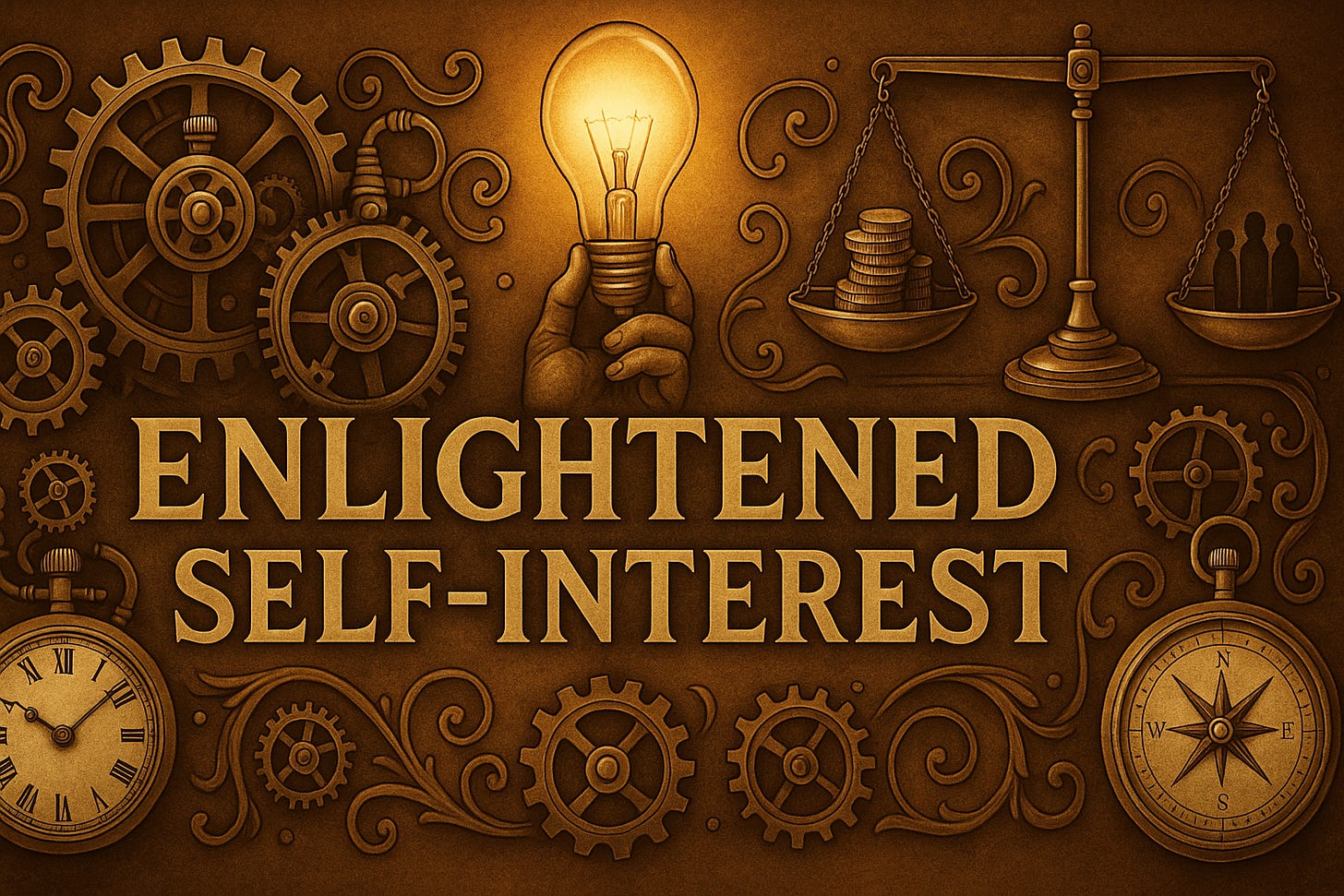
We often imagine decision-making as a tug-of-war between selfishness and altruism. Do we protect our own interests, or sacrifice them for others? Yet there is a third path—one Adam Smith hinted at in his Theory of Moral Sentiments and later thinkers refined: enlightened self-interest. It is the recognition that by acting in ways that respect others and sustain the common good, we also create the conditions for our own long-term benefit.
This principle is simple to state, but its impact on decisions—in business, politics, and personal life—can be profound, both positively and negatively.
The Core Idea: Beyond Narrow Selfishness
- Narrow self-interest: a shopkeeper cheats a customer to gain short-term profit.
- Altruism: the shopkeeper gives away goods without expectation of return.
- Enlightened self-interest: the shopkeeper treats customers fairly, knowing trust builds loyalty and long-term prosperity.
The “enlightened” part comes from foresight: recognising that self-gain is sustainable only when others benefit as well.
Positive Impacts on Decision-Making
1. Long-Term Stability
A business leader might invest in fair wages and staff development. On the surface, this appears costly. Yet the outcome is a stable workforce, higher productivity, and reduced turnover. Here, enlightened self-interest shapes a decision that benefits both company and employees.
2. Building Trust and Reputation
Political leaders who embrace transparency may face short-term criticism. However, over time, their honesty earns credibility. Trust becomes their greatest asset, reinforcing both personal legacy and societal health.
3. Sustainable Growth
Environmental stewardship often rests on enlightened self-interest. Companies that cut carbon emissions or manage resources responsibly are not only helping the planet; they are ensuring their own licence to operate in the decades to come.
Negative Impacts and Missteps
1. Self-Interest in Disguise
Sometimes “enlightened” rhetoric masks ordinary greed. A corporation may tout its “green” credentials while continuing practices that damage ecosystems. Decision-makers justify this as enlightened self-interest, but in truth it is a façade—short-term branding at the expense of long-term integrity.
2. Short Horizons
Leaders may misjudge the timeframe of benefit. For example, a manager who overworks staff in pursuit of profit may believe the company will thrive, yet this short-term “efficiency” leads to burnout, attrition, and reputational damage. The decision, made under a banner of self-interest, undermines future stability.
3. The Exclusion Problem
Enlightened self-interest can falter when decision-makers exclude those outside their immediate circle. A government might pursue policies that benefit the majority while marginalising minorities, justifying them as “good for society.” But excluding vulnerable groups erodes trust and risks long-term unrest.
A Balancing Act
Enlightened self-interest is not a formula but a discipline. It asks decision-makers to weigh:
- What serves me?
- What sustains others?
- What future am I building with this choice?
When well judged, this alignment produces resilience. When poorly judged—whether through disguise, impatience, or exclusion—the result is fragility.
Contemporary Relevance
In our knowledge-driven world, reputation, trust, and networks are the true currencies of success. Decisions rooted in enlightened self-interest can strengthen these assets, while decisions guided by narrow gain corrode them. The leaders, businesses, and communities that thrive will be those who recognise that their fate is tied to the wellbeing of others.
Closing Reflection
Adam Smith suggested that self-love, guided by sympathy and justice, can sustain both private good and public prosperity. The challenge for us today is to discern: are our decisions truly enlightened, or simply cloaked in the language of virtue?
Prompt for Readers
Think of a recent decision you made—personal, financial, or professional.
- Did it rest on narrow self-interest, altruism, or enlightened self-interest?
- Looking ahead, what are the long-term consequences of that choice for both you and those around you?